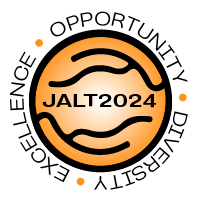8 March, 2014 - Colin Thompson
Task-Supported Language Teaching: Factors for communication and grammar use
Colin Thompson
- Thompson gave us Rod Ellis' definition of a task as an activity that requires learners to use language with an emphasis on meaning to attain an objective—not simply as conversation. There are four criteria: it focuses on meaning; there is some sort of information gap; learners rely entirely on their own resources-- linguistic and non-linguistic; and there is a clearly defined outcome. Some advantages of task-based learning are that students' communicative level can be readily seen by the teacher (facilitator) and it develops second language communication skills—because in the real world students must depend on their own resources. We then did a picture-sequencing role-play in groups to check task criteria.
- A key feature of task-based learning is that there is no pre-teaching; the pre-task just introduces the topic. The teacher helps students to complete tasks, teaching them the language they need as they look for meaning. In task-supported language teaching, on the other hand, the pre-task provides model language and the task adds meaning and form-- compromising learner autonomy for more teacher input, as with traditional PPP (Present, Practice, Produce) methodology.
- The presentation finished with a discussion of which approach is better suited to develop students' communicative skills.
Link to meeting listing

